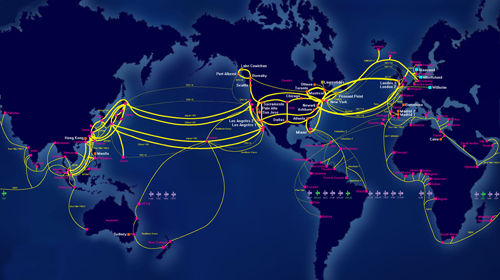
Will the NSAโs sweeping surveillance programs ironically erode the agencyโs ability to achieve the mission that it touts as its primary justification for those programs: stopping terrorist attacks? Thatโs the implication of a by the Washington Postโs Brian Fung Wednesday.
Fung notes a feature of the Internet that was first in a 2007 piece entitled โThe NSAโs Lucky Break.โ As Wiredโs Ryan Singel wrote at the time:
A lucky coincidence of economics is responsible for routing much of the world's internet and telephone traffic through switching points in the United States, where, under legislation introduced this week, the U.S. National Security Agency will be free to continue tapping itโฆ.
International phone and internet traffic flows through the United States largely because of pricing models established more than 100 years ago in the International Telecommunication Union to handle international phone calls. Under those ITU tariffs, smaller and developing countries charge higher fees to accept calls than the U.S.-based carriers do, which can make it cheaper to route phone calls through the United States than directly to a neighboring countryโฆ.
Miami sees most of the internet traffic between South America and the rest of the world, including traffic passing from one South American country to another, says Bill Manning, the managing partner of ep.net. "Basically they backhaul to the United States, do the switch and haul it back down since (it's) cheaper than crossing their international borders."
And some internet traffic traveling from Asia to Europe still crosses the entire breadth of the United States, entering in Los Angeles and exiting in New York, says Woodcock.
Fung points out that what quirks of the international telecommunications system give to the NSA, can also be taken away. He charts how the NSA scandals are prompting companies and nations around the world to start looking at how they can keep their data outside of U.S. shores. It has been repeatedly pointed out that this could be a to U.S. cloud storage and other companies, but it could also mean that surveillance that falls within international norms of legitimacy becomes more difficult.
But thanks to the NSA leaks and the governmentโs reluctance to fully disclose its activities, criminals are about to have more ways to evade online detection than ever. Investigatorsโ jobs will get far more difficult if their suspectsโ communications suddenly vanish from U.S. servers and reappear in an encrypted format in a country that wonโt cooperate with American demands.
Of course, a defender of the NSA might lament this situation and blame it all on Edward Snowden. According to this logic, if the NSA had just been able to keep its โcollect it allโ surveillance practices secret from the American people and the world forever, the United States wouldnโt be facing this dilemma.
But it seems to me that the real problem isnโt the fact that this surveillance was made public, itโs that it goes so far beyond U.S. and international norms and consensus over what degree of surveillance is acceptable in a civilized society. The chances that this surveillance would remain secret indefinitely given its lack of legitimacy were extremely low; it was under pressure from members of Congress who were restrained only by overbroad secrecy rules from blowing the whistle on it, and had been warned of by several whistleblowers from within the NSA already before Snowden.
If the U.S. government had confined its spying to the kind of targeted espionage and anti-terrorism activities that the public probably imagined the NSA was focused on, I think it would have been on safe ground internationally. The world knew about the NSA and its global eavesdropping activities, and is not shocked by espionage as traditionally practiced by many nations.
But the sweeping nature of the NSAโs newly revealed programs, as well as the intersection between the agency and companies that people deal with every dayโand often feel a personal relationship withโgo well beyond what even a cynical world understood to be going on.
The NSA today justifies its activities principally as a means of keeping the nation safe from terrorism. Ironically, had the United States eschewed dragnet spying and stuck with targeted foreign intelligence-gathering, it would not now be threatened by โdata flightโ and might remain in a better position to investigate genuine threats through the kinds of targeted eavesdropping efforts that the world does find acceptable.

